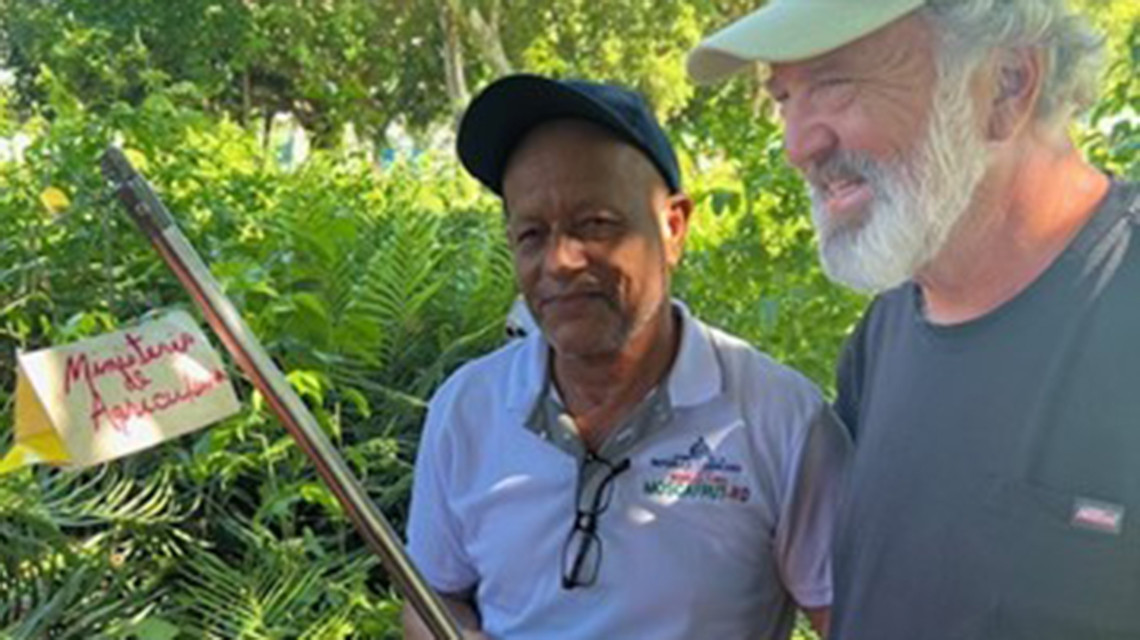In record time, the Dominican Republic was able to successfully contain a new incursion of the Mediterranean fruit fly, a highly destructive pest threatening agricultural production worldwide in 2024. This marks the second time the country has eliminated this invasive insect using the Sterile Insect Technique (SIT), an environmentally friendly pest control method.
Lessons learned from the first eradication effort in 2015, supported by the IAEA, United Nations Food and Agriculture Organization (FAO), and the International Regional Organization for Agricultural Health (OIRSA), enabled the swift and effective response to the 2023 outbreak.
The SIT involves the mass-rearing and sterilization of male pests using radiation, followed by their systematic release over infested areas. These sterile males mate with wild females, resulting in no offspring and a declining pest population. The technique is part of an integrated pest management approach and has proven essential in combating outbreaks like the medfly.
2023 Outbreak and Rapid Response
In December 2023, the Dominican Republic's Ministry of Agriculture detected the Mediterranean fruit fly near Punta Cana, triggering the activation of an emergency response protocol to contain the outbreak. Thanks to the Ministry's surveillance network, the pest was detected early and declared transient, which confined the affected area to less than 50 km² - a significant improvement compared to the 2015 outbreak that affected over 2000 km².
In February 2024, a Technical Advisory Committee (TAC) composed of IAEA, FAO, and OIRSA experts visited the area to provide guidance on tailored eradication strategies and offer technical recommendations. The National Plant Protection Organization (NPPO) implemented a contingency plan that included:
- Weekly releases of 3 million sterile flies for 26 weeks
- Field surveillance and control measures, such as insecticide-bait sprays and bait stations
- Continuous technical support from international experts
The eradication of the pest was officially declared on 27 September 2024, less than 10 months after the initial detection, with no quarantine restrictions imposed by importing countries.
"The success of this project in the Dominican Republic shows how close international cooperation can protect farmers from insect pests that can have a devastating impact on harvests and a country's agricultural production and trade," said Rui Cardoso Pereira, Section Head of the Joint FAO/IAEA Centre of Nuclear Techniques in Food and Agriculture in Vienna, Austria.
A Model for Global Collaboration
Rodrigo Castañeda, FAO Representative in the Dominican Republic, praised the nation's swift and coordinated response, highlighting the collaboration between agencies and with partner countries as a model of triangular cooperation. He specifically acknowledged the support of the Moscamed Program of Guatemala and Mexico, which provided weekly sterile flies, and the financial backing of FAO, OIRSA, and other stakeholders. "This achievement demonstrates the power of international collaboration to tackle agricultural threats and protect livelihoods," said Castañeda.
Lessons from 2015 Drive Success in 2024
The Dominican Republic's rapid eradication in 2024 reflects the significant capacity-building efforts since the first Mediterranean fruit fly incursion in 2015. That outbreak resulted in quarantine restrictions from the United States, leading to an estimated US$ 40 million in losses within nine months and putting 30 000 jobs at risk. The pest was eventually eradicated in 2017 after two years of intensive efforts, which included the release of 4.06 billion sterile flies.
This earlier experience equipped the country with the knowledge and tools to address future incursions more effectively. "Today, we continue trapping and maintaining quarantines at entry points, supported by additional phytosanitary measures such as insecticide-bait sprays, bait stations, and the use of SIT," said Dario Vargas, Deputy Minister of Agriculture Extension.

Yellow Panel trap with trimedlure in use for the confirmation of the Mediterranean fruit fly eradication. (Photo: R. Cardoso Pereira/FAO/IAEA)
Agriculture at the Heart of the Nation
Agriculture plays a crucial role in the Dominican Republic's economy, generating US $2.9 billion in exports in 2022. Key markets include the United States, which accounts for 54.3 per cent of exports, and key products such as avocados, which generate significant revenue. The sector supports thousands of families, supplies 80 per cent of domestic food demand, and ensures food security for the country's 11 million residents and 10 million annual tourists.
A Model for the Future
The 2024 eradication underscores the importance of early detection, international cooperation, and advanced pest management techniques like SIT. By leveraging nuclear technology and sustained capacity-building, the Dominican Republic has demonstrated how timely, coordinated action can prevent agricultural crises and safeguard food security. As Najat Mokhtar, Deputy Director General of the IAEA, stated, "The Dominican Republic's success is a testament to the transformative power of nuclear technology, capacity-building efforts, and the dedication of local teams. These partnerships will continue to play a pivotal role in safeguarding food security and supporting agricultural resilience worldwide."

Jackson trap with trimedlure in use for the detection of Mediterranean fruit fly. (Photo: R. Cardoso Pereira/FAO/IAEA)






